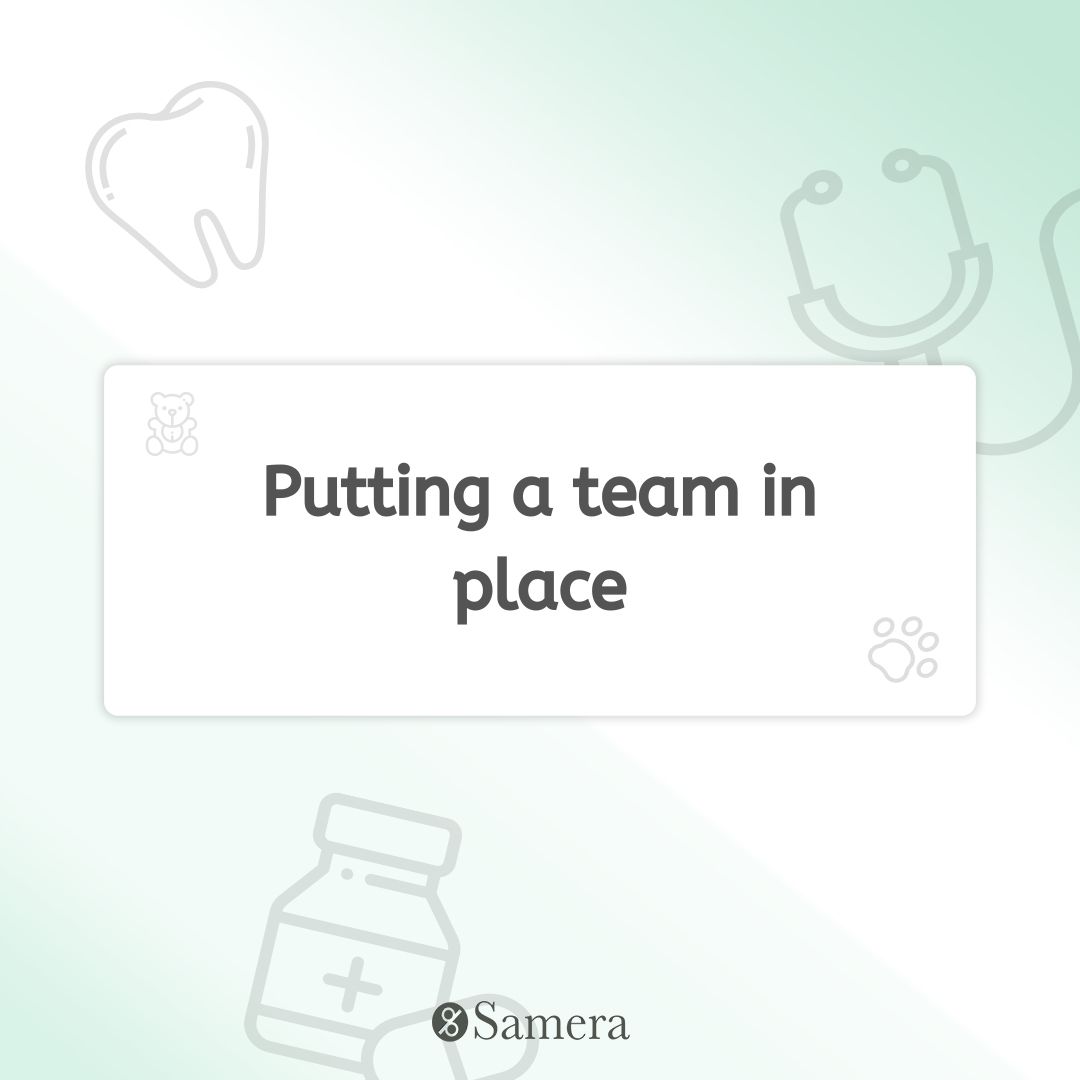In this article we will take a look at building a good dental team and keeping it up to scratch.
Putting a good dental team together.
The General Dental Council provides details of standards for the dental team. I would guess that most people reading this will be aware of that fact, but it’s worth another read. When putting a team in place they need to be people who will adhere to these standards and to the aims and culture of the practice overall.
Why a good fit is so important
When a dental practice is purchased, there is often a professional team already in place. This does not mean that these people are the best fit for the new practice. I’ve worked with several clients who have quickly found it impossible to operate effectively because of a significant clash in practices and differences between the culture of the old practice and that of the new one.

Just because someone has a wealth of qualifications and a good record does not mean they are the best fit for the business that a new purchaser is trying to grow. For instance, I have heard people complain about dentists who have no sense of humour and are not the best with people who are nervous. If one of the aims of a practice is to specialise in providing care for people who have a phobia of dental treatments, this type of professional would not be a good team member.
What are the most important qualities?
There is a good chance that people already working at the practice, and/or those seeking employment, will have similar skill sets. However, the qualities they have may be very different. One of the most important tasks for any new dental practice owner is to decide which qualities are important to smooth running of the surgery, such as:
- The ability to work as a team.
- Problem solving ability.
- Reliability.
- A level head.
- An empathetic nature.
- Good time keeping.
It’s important that members of the team possess qualities that are in line with the aims and culture of the practice.
Step back and evaluate
It’s never a good idea to make snap judgements about members of a team that is already in place. Do not forget that everyone needs time to adjust to a new situation. Step back from the day to day operations for a little while and simply evaluate how people work and how they interact with each other.
It’s also important to speak to people and ask them about their aims and aspirations. This will help to make it apparent if they are going to have issues working within the practice as it will be operated.

Contact us to find out more
Hiring new members of the dental team
There may be a need to hire new team members for a dental practice that has just been purchased. It’s possible to list available posts with the British Dental Journal or to ask a specialist dental professional recruitment agency for help. It’s important to do the ground work before the job is listed and/or potential candidates are sought.
- What qualifications and experience are necessary for the role?
- What services are to be provided by the individual?
- What additional skills would be advantageous?
- What qualities are important?
The ideas and requirements that are collated help to formulate a description of the job role. They are also a big help during the interview process.
The interview process
Depending on how many candidates there are, it may be a good idea to reduce the list by telephoning each candidate and asking them why they want to work for this particular practice and how they see themselves as a good fit. Anyone who has not done their research, or is obviously not the right fit, can be weeded out.
During the interview itself, the questions should reflect the real world within the practice. Some questions it may be useful to ask include:
- Give an example of how your working practices fit with the aims of this surgery.
- Tell us about how you would go about implementing an improvement to processes; give an example.
- Explain how you would handle a nervous patient.
- Explain what you would do if a patient was late.
It can be useful to take a look at some questions that dental industry candidates have been asked.

Welcoming new team members
Once the right team is in place, it’s important to make sure that they remain satisfied in their work and motivated. High motivation levels lead to good standards of productivity and performance. These good standards are essential to the survival and growth of any dental practice.
In order to keep motivation levels high it’s important to:
- Provide a comprehensive induction package.
- Have an open, learning-based culture.
- Communicate the aims and culture of the practice.
- Hold regular staff meetings.
- Implement a fair on-going assessment and appraisal process.
- Encourage self-development and training.
People who work in this type of environment are more likely to want to contribute to the on-going success of the dental practice.
Keeping a good dental team in place
I believe in starting with the basics, when it comes to growing a dental practice. Having the right team in place means that treatment and patient care are of high quality. This makes it easier to retain patients, and to attract new ones. Retaining, and increasing, a patient pool is essential for any dental surgery that wants to see profits grow and expansion occur.
Retaining a professional, caring and highly motivated team is essential for anyone who has ambitions to grow a successful dental practice. There are several points that I always reinforce with clients which can make staff retention a lot easier.
Creating a positive working environment
The first step to take when creating a positive working environment in a dental surgery is to make sure that everyone is on the same page. Every member of the team needs to be aware of the vision of the practice, and to be on board with it. Remember that a vision is not set in stone. As a practice evolves, so the vision can be tweaked to reflect the way forward.
This vision needs to be at the centre of everything that happens in a flourishing dental practice. It also needs to be supported by other factors which make the surgery an excellent place to work. These factors may include:
- Emphasis on a good work/life balance.
- Additional benefits on top of salary.
- Use of the latest technology.
- Access to ongoing training and education.
- Recognition for a job well-done. This can be as simple as thank-you or may involve a bonus scheme.
For dental professionals, one of the best ways to check for a good working environment in their practice is to put themselves in the place of every staff member and be honest about whether they would really want to work there. Doing this can be a real eye opener; I’ve used it as a tool myself over the years.
Contact us to find out more
Encouraging good performance
Every successful business needs to have an appraisal process in place; dental practices are no different. This should not be seen as a way of monitoring members of the team; it needs to be seen as a chance to develop, learn and be rewarded for success.
I have always found that 360 degree feedback is useful as part of this process. I have certainly learned important things about myself in this way. Remember, it’s about providing excellent patient care, and growing the business as a result. There is no place for an inflated ago.
In any successful appraisal system there are some important points to get right.
- Create clear and specific job roles so that there is no room for confusion.
- Create SMART goals which each team member can work towards achieving and be measured against. Creating goals which are Specific, Measurable, Achievable, Realistic and Timed gives people more chance of achieving them (2)
- Make sure that every team member has a personal development plan in place (PDP). This can be especially important in an SME like a dental practice where career advancement opportunities may be limited but development can be encouraged and supported.
- Use key performance indicators (KPIs) to measure performance so that measurement standards are consistent.
Performance appraisal reviews should normally happen every twelve months, but there should be opportunity to talk at any time.
According to Forbes,
“The most common form of performance appraisals compare our current performance levels either with our previous performance levels or the performance levels of our peers. When the two approaches were compared, the researchers found that comparing our performance now with our performances in the past was more effective because employees regarded them as fairer, especially on an interpersonal level.”
This makes sense in a dental surgery where staff numbers are limited and comparing peers may promote discord rather than the harmony that is required. The aim of any successful appraisal system is to improve individual and overall performance in a motivational and supportive manner.
Communicating is key
I have never come across a client yet who has disagreed with my assertion that effective communication is at the centre of any successful dental surgery. However, with the best will in the world, communications become confused and messy, if there is no strategy and plan in place. These plans can include factors such as:
- Defined communication timelines.
- Creation of a staff Intranet system.
- Daily and Weekly team meetings.
- Defined methods of communicating management plans and concerns.
Poor communication tends to lead to poor performance, reduced patient satisfaction and reduced chance of growth. Never take communication for granted.
These are all factors that can help keep a good team in place in a dental practice. The longer a good team is retained, the more likely a practice is to thrive and grow.
Learn more: Related Articles
About the Author

Arun Mehra
With almost twenty years of commercial experience and knowledge in Dentistry, Arun’s expertise is valued by hundreds of businesses across the UK. His financial acumen and know-how, along with his hands-on commercial expertise have helped clients, large and small, new and established to achieve great things.
Arun is the founder of the Samera Group, starting the business with just one client sitting at his father’s dining table. Fifteen years on, Team Samera now service hundreds of Dental clients, run exciting events, help clients raise finance, and are very active in helping clients buy or sell Dental practices.
Starting a Dental Practice: Get Started
We’ve been helping the UK’s dentists start their own practices for nearly 20 years and we know exactly what it takes to make your practice a success!
Our Dental Practice Start-up Programme is a hands-on consultancy service designed to take you through your whole journey to becoming a dental practice owner. Book a free, no-obligation consultation with one of our team at a time that suits you (including evenings). We’ll call you back and have a chat about how we can help start your dream practice.
Contact us today for all the advice, support and expertise you’ll ever need to start a dental practice.
Learn More: Starting a Dental Practice
For more information please check out the articles and webinars in the start a dental practice section of our Learning Centre, like our guide on How to Start a Dental Practice in 13 Steps.
Make sure you never miss any of our articles, webinars, videos or events by following us on Facebook, LinkedIn, YouTube and Instagram.
